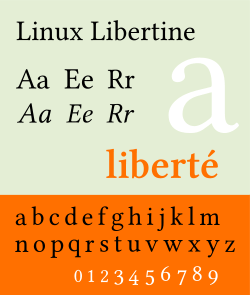Linux Libertine
 | |
| Category | Serif |
|---|---|
| Classification | Transitional |
| Designer(s) | Philipp H. Poll |
| Foundry | Libertine Open Fonts Project |
| Date released | July 2012 |
| License | GPL / OFL |
| Shown here | Version 5.3.0 |
| Latest release version | 5.3.0 |
 | |
| Category | Sans-serif |
|---|---|
| Classification | Humanist |
| Designer(s) | Philipp H. Poll |
| Foundry | Libertine Open Fonts Project |
| Date released | July 2012 |
| License | GPL / OFL |
|
| |
| Sample | |
| Shown here | Version 5.3.0 |
Linux Libertine is a digital typeface created by the Libertine Open Fonts Project, which aims to create free and open alternatives to proprietary typefaces such as Times Roman. It is developed with the free font editor FontForge and is licensed under the GNU General Public License and the SIL Open Font License.[1]
Characteristics
Linux Libertine is a proportional serif typeface inspired by 19th century book type and is intended as a replacement for the Times font family.[1]
The typeface has five styles: regular, bold, italic, bold italic, and small capitals, all of which are available in TrueType and OpenType format, as well as in source code. The OpenType version allows automatic positioning and substitution, including true fractions, ligatures and kerning.
There is also a complementary humanist sans-serif face, Linux Biolinum, similar to Optima or Candara. It is available in bold and italic styles.
Unicode coverage
Linux Libertine contains more than 2,000 glyphs and encompasses character sets such as the Greek Alphabet, Cyrillic script, and Hebrew alphabet. Additionally, it offers several ligatures (such as ff, fi, and ct, and the capital ß). It also includes special characters such as International Phonetic Alphabet, arrows, floral symbols, Roman numbers, text figures, and small caps. The Tux mascot is included at the Unicode code point U+E000.
Distribution
Linux Libertine and Linux Biolinum are bundled with LibreOffice as of the suite's 3.3 release,[2] with some features added in the 3.5 release.[3] LibreOffice is the default office suite in many Linux distributions, such as Fedora,[4] Linux Mint,[5] openSUSE[6] and Ubuntu.[7]
Usage
In 2010, Linux Libertine was adopted as an open-source substitute for the Hoefler Text typeface in the redesign of the Wikipedia logo, making it possible to localize the Wikipedia identity into more than 250 languages and character sets.[8] The "W" character, which had previously been used in various other places in Wikipedia (such as the favicon) and was a "distinctive part of the Wikipedia brand", had "crossed" V glyphs in the original logo, while Linux Libertine has a joined W letter shape. As a solution, the "crossed" W was added to Linux Libertine as an OpenType variant.[9][10]
Both the Linux Libertine and Linux Biolinum typefaces are used by the open-source design publication Libre Graphics Magazine.[11]
See also
- Free software Unicode typefaces
- GNU General Public License
- List of typefaces
- SIL Open Font License
- Unicode fonts
References
- 1 2 Byfield, Bruce (August 28, 2006). "Linux Libertine Open Fonts offers free Times Roman alternative". Linux.com. Archived from the original on May 21, 2011. Retrieved June 18, 2012.
- ↑ "Bundled Linux "Libertine G" and Linux "Biolinum G" fonts". Libreoffice.org. Retrieved 2013-09-30.
- ↑ "Release Notes 3.5". The Document Foundation wiki. February 21, 2012. Retrieved February 23, 2012.
- ↑ "Features/LibreOffice". fedoraproject.org. Retrieved 2 April 2011.
- ↑ "Linux Mint 11 "Katya" released". The H. Heinz Heise. 26 May 2011. Retrieved 29 May 2011.
- ↑ "openSUSE 11.4 Will Be First To Roll Out With LibreOffice". opensuse.org. 7 March 2011. Retrieved 18 May 2011.
- ↑ "Features/Office applications". ubuntu.com. Retrieved 3 May 2011.
- ↑ Walsh, Jay (May 13, 2010). "Wikipedia in 3D". Wikimedia Blog. Retrieved February 20, 2012.
- ↑ Poll, Philipp H. "New Wikipedia-Logo using LinuxLibertine". Libertine Open Fonts Project. Retrieved 2011-01-30.
- ↑ Walsh, Jay (May 13, 2010). "Wikimedia official marks/About the official Marks". Wikimedia Foundation. Retrieved February 20, 2012.
- ↑ Carvalho, Ana Isabel; coons, ginger; Lafuente, Ricardo (2010). "Production Colophon" (PDF). Libre Graphics Magazine. Libre Graphics Magazine. 1 (1): 7. ISSN 1925-1416. Retrieved 2011-07-18.
External links
| Wikimedia Commons has media related to Linux Libertine. |